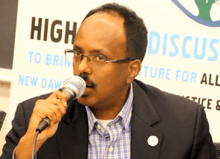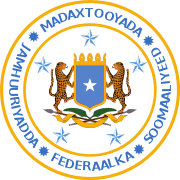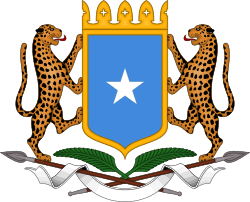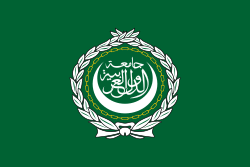Mohamed Abdullahi Mohamed
Mohamed Abdullahi Mohamed (born 11 March 1962), also known as Farmaajo,[2][3] is a Somali politician and diplomat who has served as the 9th and current President of Somalia since 16 February 2017. At the time of his election he had dual Somali and U.S. citizenship.[4] He was previously a Prime Minister of Somalia from November 2010 until June 2011 and is the founder and Chairman of the Tayo Political Party. He became the President of Somalia after winning in the 2017 Somali presidential election with 184 votes out of a total of 329 by members of the Somali Parliament after defeating former president Hassan Sheikh Mohamud.[5]
His Excellency Mohamed Abdullahi Farmaajo | |
|---|---|
.jpg) Mohamed in 2017 | |
| 9th President of Somalia | |
| Assumed office 16 February 2017 | |
| Prime Minister | Hassan Ali Khayre |
| Preceded by | Hassan Sheikh Mohamud |
| 14th Prime Minister of Somalia | |
| In office 1 November 2010 – 19 June 2011 | |
| President | Sharif Sheikh Ahmed |
| Preceded by | Abdiwahid Elmi Gonjeh (Acting) |
| Succeeded by | Abdiweli Mohamed Ali |
| Leader of the Tayo Party | |
| Assumed office 5 May 2012 | |
| Preceded by | Position established |
| Personal details | |
| Born | 11 March 1962 Mogadishu, Somali Republic |
| Citizenship | Somali, American (renounced in 2019) |
| Political party | Tayo |
| Spouse(s) | Zeinab Abdi [1] |
| Education | University at Buffalo (BA, MA) |
Background
Early life
Mohamed was born in Mogadishu. His father was well known in Waberi District as Formaggio, the Italian word for "cheese", and as a result Mohamed was nicknamed Farmajo.[6][7][8][9][10]
His parents were activists affiliated with the Somali Youth League (SYL), Somalia's first political party. During the 1970s, his father worked as a civil servant in the national Department of Transportation.[11]
Mohamed attended a boarding school in Somalia.[11] Between 1985 and 1988, he worked as a secretary in the Somali embassy in Washington, D.C..[10] Between 1989 and 1993, he completed a Bachelor's degree in History and a Masters Degree in Political Science from the University at Buffalo in Buffalo, New York.
Mohamed is a Somali citizen.[12][13] Prior to August 2019, he also held American citizenship, which he voluntarily renounced.[14]
Early career
In an administrative capacity, Mohamed worked at the Ministry of Foreign Affairs of Somalia before the collapse of the central government in 1991 and the ensuing civil war.[15] Between 1985 and 1988, he also acted as First Secretary in the Somali embassy in Washington and worked with various human rights organizations.[12][15][16]
From 1994 to 1997, Mohamed was chosen as an at-large Commissioner for the Buffalo Municipal Housing Authority, and worked there as the finance chairman.[7][13] He also served as case manager for a lead abatement program in the city from 1995 to 1999. Between 2000 and 2002, Mohamed was a minority business coordinator for the Erie County Division of Equal Employment Opportunity.[13] From 2002 until his appointment as Prime Minister in late 2010, he worked as Commissioner for Equal Employment at the New York State Department of Transportation in Buffalo.[15]
Mohamed also taught leadership skills and conflict resolution at Erie Community College, part of the State University of New York (SUNY).[12]
Prime Minister (2010-2011)
Appointment
On 14 October 2010, Mohamed was appointed the new Prime Minister of Somalia. He replaced Omar Abdirashid Ali Sharmarke, who resigned the month before following a protracted dispute with the President.[12] Lawmakers overwhelmingly approved Mohamed's appointment on 31 October 2010. 297 of the 392 Members of Parliament endorsed the selection via hand-raising; 92 MPs voted against and 3 abstained.[17][18]
United Nations Secretary General Ban Ki-moon congratulated Mohamed on his new appointment, and commended the Somali leadership for having reached a consensus on procedural arrangements that facilitated a transparent and consultative confirmation of the Premier.[19] African Union chairman Jean Ping also welcomed the new Prime Minister and re-affirmed the AU's support for the Somali government.[20]
On 1 November 2010, Mohamed was sworn into office at a ceremony held in the presidential residence, Villa Somalia.[21]
New Cabinet
On 12 November 2010, Mohamed named a new Cabinet,[22] as per the Transitional Federal Government's (TFG) Charter.[23]
The Premier issued a statement indicating that "the Somali people and the international community were waiting for a competent and credible Somali cabinet, and I am happy to appoint this lean but capable cabinet".[24]
As had been expected, the allotted ministerial positions were significantly reduced in number, with only 18 administrative posts unveiled versus the previous government's bloated 39 portfolios.[22][24] Only two Ministers from the previous Cabinet were reappointed: Hussein Abdi Halane, the former Minister of Finance and a well-regarded figure in the international community, was put in charge of a consolidated Ministry of Finance and Treasury; and Dr. Mohamud Abdi Ibrahim was reassigned to the Ministry of Commerce and Industry.[25]
Ahlu Sunna Waljama'a, a moderate Sufi group and an important military ally of the TFG, was also accorded the key Interior and Labour ministries.[24][25]
The remaining ministerial positions were largely assigned to technocrats new to the Somali political arena:[26] Abdihakim Mohamoud Haji Faqi, a former diplomat, was appointed one of several Deputy Prime Ministers in addition to the important post of Minister of Defense; the diplomat Mohamed Abdullahi Omaar resumed duties as Foreign Minister, a position he had already held in the past; Dr. Maryan Qasim Ahmed joined the government as Minister for Women and Family Affairs; Dr. Abdi Shakur Sheikh Hassan Farah as Minister for Internal Affairs and Security; Abdirashid Khalif Hashi as Minister of Housing and National Rebuilding; Abdulkareem Hassan Jama as Minister of Information; and Abdullahi Abyan Noor as Minister for Justice and Religious Issues.[24][25][26]
President Sharif Sheikh Ahmed welcomed the new Cabinet and encouraged parliament to endorse the appointments.[26] Parliament approved Mohamed's new government on 27 November 2010. 251 of the 343 lawmakers that attended the voting session endorsed the Cabinet, while 92 legislators opposed it.[27]
Reforms
In his first 50 days in office, Prime Minister Mohamed's administration completed its first monthly payment of stipends to government soldiers, and initiated the implementation of a full biometric register for the security forces within a window of four months. Additional members of the Independent Constitutional Commission were also appointed to engage Somali constitutional lawyers, religious scholars and experts in Somali culture over the nation's scheduled new constitution, a key part of the government's Transitional Federal Tasks. In addition, high level federal delegations were dispatched to defuse clan-related tensions in several regions.[28]
To improve transparency, Cabinet ministers fully disclosed their assets and signed a code of ethics. An Anti-Corruption Commission with the power to carry out formal investigations and to review government decisions and protocols was also established so as to more closely monitor all activities by public officials. Furthermore, unnecessary trips abroad by members of government were prohibited, and all travel by ministers now require the Premier's consent.[28][29] A budget outlining 2011's federal expenditures was also put before and approved by members of parliament, with the payment of civil service employees prioritized. In addition, a full audit of government property and vehicles is being put into place.[28]
On the war front, the new government and its AMISOM allies also managed to secure control of 60% of Mogadishu, where 80% of the capital's population at the time lived. With almost a thousand newly trained government troops on the way, set to be augmented by an additional 4000 AMISOM soldiers, the pace of territorial gains was expected to greatly accelerate.[28]
Kampala Accord
Overseen by the Ugandan President Yoweri Museveni and the U.N. Special Envoy to Somalia Augustine Mahiga, the Kampala Accord would see the technocratic Cabinet that Prime Minister Mohamed had assembled in November 2010 re-composed to make way for a new government. Announcement of Prime Minister Mohamed's proposed resignation was immediately met with violent protests in various cities.
Thousands of civilians, many government soldiers, and some legislators marched through the streets of Mogadishu.[30][31] The angry protesters demanded that the Premier be reinstated.[30] Posters of the UN Special Envoy were symbolically burned, with protesters appealing to the UN Secretary General to dismiss Mahiga.
Attacks on hotels in which members of parliament were staying and at least five deaths were reported. Additional demonstrations against the Premier's resignation were held in Galkacyo, a key trading city in the north-central Mudug region, as well as in Belet Hawo in the far south.[30] Internationally, protests also reportedly took place in Cairo, Nairobi, Johannesburg, Sydney, London, Rome, Stockholm, Minneapolis, and Toronto.
In response, Prime Minister Mohamed released a statement through the state-run Radio Mogadishu commending the military for its rapid response and urging its troops to exercise restraint. He also appealed to the public to calm down, and indicated that "I have seen your expressions and heard your calls[...] You are part of the decision making—what you want must be heard."[30] Additionally, in a press conference, the Premier called for the immediate release of all protestors who had been detained, and stated that his administration would launch an independent investigation into their arrest.[32] Weighing in on the demonstrations, Mogadishu's Mayor Mohamed Nur suggested that putting the issue before Parliament for approval would be a democratic course of action.[33]
On 11 June 2011, Prime Minister Mohamed released a statement indicating that the Kampala decision ought to be presented in Parliament for debate and appraised according to the laws stipulated in the national constitution. The Premier also stated that he would only step down if lawmakers voted to uphold the accord.[34] This was echoed by the Cabinet, which indicated in a press release that, after having convened to discuss the Kampala decision, the Ministers agreed that the accord must be put before Parliament for evaluation.[35] In addition, over 200 parliamentarians reportedly sought to urge the Prime Minister to reconvene Parliament so as to deliberate the decision, indicating in a separate statement that the accord deprived MPs of their legislative role vis-a-vis the government.[34]
On 12 June 2011, President Sharif Sheikh Ahmed released a statement wherein he condemned the violent protests, describing them as "illegal".[35][36] He also suggested that some government officials were financing the rallies in Mogadishu, and warned that the Al-Shabaab group of Islamists that is waging war against the federal government could try to exploit the gatherings to launch terrorist attacks.[36]
The same day, news reports surfaced indicating that UN Secretary General Ban Ki-Moon would sack Special Envoy Augustine Mahiga on account of a lack of tangible progress made and public confidence in Mahiga's work in Somalia. UN sources also stated that, due to prevalent allegations of graft, the Secretary General would fire half of the senior staff in various UN bureaus, including the UNPOS, UNDP, UNICEF, WHO and OCHA.
In an interview on 16 June 2011, the Undersecretary for Foreign Affairs of Italy, Alfredo Mantica, expressed support for Prime Minister Mohamed's position with regard to the Kampala agreement. Mantica stated that the Italian government believed that the accord ought to be reviewed in Parliament. He also indicated that "the prime minister has been in office five months. And [it is too] early to judge his work. But what he has done so far has been very positive. It has achieved important results. The government already seemed a miracle[...] The strength of the instability in Somalia is a constant. And the prime minister represents stability."[37]
Resignation
Mohamed Abdullahi Mohamed resigned from his position as Prime Minister of Somalia on 19 June 2011. Part of the controversial Kampala Accord's conditions, the agreement would also see the mandates of the President, the Parliament Speaker, and Deputies extended until August 2012, after which point new elections are to be organized. In his farewell speech, Prime Minister Mohamed indicated that he was stepping down in "the interest of the Somali people and the current situation in Somalia". He also thanked his Cabinet for its efforts in improving the security situation and the standards of governance in the country.[2]
Abdiweli Mohamed Ali, Mohamed's former Minister of Planning and International Cooperation, was appointed as Acting Premier later the same day.[38][39] A few days later, on 23 June 2011, Ali was named permanent Prime Minister.[40]
Sheikh Hussein Ali Fidow, a spokesman for Al Shabaab militants, told reporters on 22 June 2011 that "it is clear for the Somali people and the international community that [the] Kampala meeting [on] Somalia was aimed to coerce the Prime Minister Mohamed Abdullahi Mohamed to step down". In addition, the Al Shabaab spokesman suggested that Somalia's citizenry was aware of what was going on and that it (Al Shabaab) did not recognize President Sharif Ahmed and the Parliament Speaker Sharif Hassan as legitimate governmental authorities.[41][42]
On 24 June 2011, lawmakers reaffirmed their opposition to and intention of repealing the Kampala decision. The Chairman of the federal Information, Public Awareness, Culture, and Heritage Committee, Awad Ahmed Ashareh, indicated that 165 legislators had tendered a motion in Parliament opposing the agreement, but the Speaker rebuffed it. Ashareh also stated that MPs would issue a vote of no confidence vis-a-vis the Speaker Hassan if he continued to refuse to permit debate to take place, suggesting that Hassan's refusal "contravenes the Charter and rules of procedure."[43]
Following talks with parliamentarians, President Sharif Sheikh Ahmed asserted on 28 June 2011 that, on account of opposition among legislators to the Kampala Accord, it would be brought before Parliament for deliberation. He also indicated that the agreement would not be implemented unless approved by lawmakers.[44]
After his resignation, Mohamed returned to the United States and his old position at the New York State Department of Transportation.[45]
Tayo

In early 2012, Mohamed and members of his former Cabinet established the Tayo ("Quality") political party, so named after the generally favorable reputation that his administration earned during its brief tenure under President Sharif Sheikh Ahmed.
According to Mohamed, the party's primary agenda would revolve around delivering services to Somalia's general population and encouraging the repatriation of Somali diasporans so as to assist in the post-conflict reconstruction process.
After stepping down from office, Mohamed had been campaigning in various global destinations to amass support for his new party, including the United States, the United Kingdom, the Netherlands, and Sweden.[46]
2012 presidential elections
In early August 2012, Mohamed presented himself as a presidential candidate in Somalia's 2012 elections but was eliminated in the first round of voting.[47]
Graduation program
In August 2013, Mohamed served as a keynote speaker at the Fourth Annual Ohio Somali Graduation Program in Columbus, Ohio. The event brought together hundreds of students, parents, professionals and leaders to honor the state's Somali secondary and tertiary graduates. Former Minister of Education of Somalia Hassan Ali Mire was a guest speaker, with financial scholarships awarded to the most outstanding pupils.[48]
Presidency (2017 - present)
.jpg)
Mohamed ran for president against 19 opponents.[49] His campaign was based on nationalism, freedom from famine, and the defeat of the Islamic militant movement of Al-Shabaab.[50] The voters were limited to 275 members of parliament and 54 senators,[49] and there were widespread reports of vote-buying.[50] In a run-off, he ran against three remaining candidates, until incumbent President Hassan Sheikh Mohamud conceded.[50] As a result, Mohamed won the 2017 elections on 8 February[51] and was sworn into office on 16 February. During his inauguration, Somalia's new president called on al Shabaab fighters and other Islamist militant groups to surrender. "To those who work with al Qaeda, al Shabaab and IS (Islamic State), your time is finished," he said at the inauguration ceremony.[52]
Renunciation of U.S. Citizenship
In August 2019 after two and a half years in office, it was announced by the Presidential office that President Mohamed intended to renounce his U.S. citizenship. No reason was given which prompted speculation as to why. During his time in office, the U.S. has dramatically increased airstrikes against al-Shabab, re-established the American diplomatic presence in Somalia, and presented Mohamed with a trucker cap that said “Make Somalia Great Again.”[53]
References
- "Reuters, Somali president appoints oil firm executive as PM". Archived from the original on 2017-12-07. Retrieved 2017-12-07.
- "Somalia: PM Mohamed Abdullahi Mohamed resigns". BBC News. Archived from the original on 16 September 2015. Retrieved 31 May 2015.
- Zoppi, Marco. "Somalia: federating citizens or clans? Dilemmas in the quest for stability." Journal of Contemporary African Studies 36.1 (2018): 54-70.
- "Somalia president abandons U.S. citizenship 'voluntarily'". Africa News. 1 August 2019. Archived from the original on 3 August 2019. Retrieved 3 August 2019.
- Jama, Hassan (5 August 2015). "Interview with former Somali PM Mohamed Abdullahi Mohamed "Farmaajo"". Special Broadcasting Service. Archived from the original on 11 February 2017. Retrieved 8 February 2017.
- Yahye M (14 October 2010). "Somalia:New Somali PM Appointed-Marehan Clan former president family". Suna Times. The Netherlands. Archived from the original on 2 April 2015.
- Somalia's President Sharif Sheikh Ahmed appointed a new prime minister Thursday, replacing the previous premier with whom he had differences and who resigned last month
- "Somali president appoints new PM". Archived from the original on 8 March 2011. Retrieved 31 May 2015.
- UN Special Envoy to Somalia meets TFG leaders in Mogadishu over PM rift
- "Profile: Somalia's 'cheese' President, Mohammed Abdullahi Mohammed 'Farmajo'". Archived from the original on January 22, 2018. Retrieved January 21, 2018.
- Majabe, A. M. "Why We Need PM Farmajo of Somalia To Run For President In 2012". Allgedo.com. Archived from the original on 4 March 2016. Retrieved 31 May 2015.
- Somali-American is new prime minister in Somalia
- "UB grad is named prime minister of Somalia". The Buffalo News. Archived from the original on 11 June 2011. Retrieved 31 May 2015.
- "Somalia's president gives up US citizenship, but unclear why". Associated Press. Archived from the original on 2019-08-01. Retrieved 2019-08-01.
- "New Somali Prime Minister's "Experience" Praised by Analyst". VOA. Archived from the original on 4 March 2012. Retrieved 31 May 2015.
- "UPDATE 1-Somali president nominates Mohamed Abdullahi as PM". Archived from the original on 4 March 2016. Retrieved 31 May 2015.
- "Somali parliament approves new prime minister". Reuters. 31 October 2010. Archived from the original on 9 January 2015. Retrieved 31 May 2015.
- parliament approves new premier/-/1066/1043934/-/36b2q7z/-/ Somali parliament approves new premier
- F_404. "UN chief encourages new Somalia PM to form government". Archived from the original on 8 November 2010. Retrieved 31 May 2015.
- "Indymedia Lëtzebuerg – Onoofhängege Journalistekollektiv". Archived from the original on 25 August 2011. Retrieved 11 February 2017.
- "Somalia Prime Minister sworn in; pledges to negotiate with rebels". Alshahid Network. Archived from the original on 1 February 2016. Retrieved 31 May 2015.
- New Somalia prime minister unveils smaller Cabinet, cutting 21 'bloated' positions, gov't says
- Approves Somalia’s New PM After Repeated Delays
- Somali PM unveils leaner cabinet
- Somali Premier Unveils New Cabinet
- "Somali PM names new cabinet". Archived from the original on 23 October 2013. Retrieved 31 May 2015.
- "Somalia MPs endorse new cabinet". Archived from the original on 8 March 2011. Retrieved 31 May 2015.
- "Prime Minister's Speech to the UN Security Council". Archived from the original on 5 January 2014. Retrieved 11 February 2017.
- "Site Unavailable". Archived from the original on 15 May 2011. Retrieved 31 May 2015.
- "More Clashes in Somalia; Minister Is Killed". The New York Times. 11 June 2011. Archived from the original on 31 July 2017. Retrieved 11 February 2017.
- Kampala Accord: A setback for the TFG and the International Community
- Somalia prime minister says he won't resign
- "Death of 'Abdirahman the Canadian' investigated in Somalia". thestar.com. 10 June 2011. Archived from the original on 24 October 2012. Retrieved 31 May 2015.
- "Somalia PM says will quit only if parliament agrees". Reuters. Archived from the original on 9 January 2015. Retrieved 31 May 2015.
- Somali parliament must vote on PM's dismissal: cabinet
- "Somali president: Mogadishu rallies funded by some politicians". Archived from the original on 9 May 2015. Retrieved 31 May 2015.
- Italy Supports Prime Minister Farmajo’s position
- Jeffrey Gettleman (19 June 2011). "Lauded Somalian Prime Minister Resigns Under Pressure". The New York Times. Archived from the original on 16 June 2017. Retrieved 27 February 2017.
- "Somali Prime Minister Unveiled His Cabinet". English.alshahid.net. Archived from the original on 2011-05-11. Retrieved 2011-06-12.
- Gettleman, Jeffrey (2011-06-23). "Somalia Names New Prime Minister". New York Times. Archived from the original on 2011-06-26. Retrieved 2011-06-23.
- "Al Shabab says Kampala meeting ended failure". Archived from the original on 9 May 2015. Retrieved 31 May 2015.
- "Somalia: Al Shabaab - Kampala Accord Was TFG's Failure". 22 June 2011. Archived from the original on 20 October 2012. Retrieved 11 February 2017 – via AllAfrica.
- Barasa, Lucas (24 June 2011). "Somalia: Return Country to Stability, New PM Urged". Archived from the original on 20 October 2012. Retrieved 11 February 2017 – via AllAfrica.
- "Somali president says Kampala accord will not be conducted unless parliament approved". Archived from the original on 9 May 2015. Retrieved 31 May 2015.
- Rey, Jay (2011-08-07). "Return 'home' surreal after Somalia sojourn". Buffalo Times. Archived from the original on 2011-08-07. Retrieved 2011-08-07.
- "SomaliaReport: Former PM Farmajo Forms New Political Party". Archived from the original on 24 September 2015. Retrieved 31 May 2015.
- "Somalia Federal Parliament elects Hassan Sheikh Mohamud as President". Garowe Online. 10 September 2012. Archived from the original on 13 September 2012. Retrieved 10 September 2012.
- "Prime Minister Farmajo to Honor Somali Graduates in Ohio". Jibril Mohamed. Archived from the original on 24 December 2013. Retrieved 21 December 2013.
- Aglionby, John (8 February 2017). "Farmaajo begins 'era of unity' as Somali president". Financial Times. Archived from the original on 9 February 2017. Retrieved 9 February 2017.
- "Somalia's Mohamed Abdullahi Farmajo chosen as president". BBC News. 8 February 2017. Archived from the original on 8 February 2017. Retrieved 8 February 2017.
- "Former PM and dual-US citizen wins Somali presidential election". The Guardian. 8 February 2017. Archived from the original on 30 July 2018. Retrieved 8 February 2017.
- "At inauguration, Somali president calls on al Shabaab to surrender". Reuters. 2017-02-22. Archived from the original on 2017-02-22. Retrieved 2017-02-23.
- "Somalia's President Gives Up US Citizenship, But Unclear Why". VOA. 2019-08-01. Archived from the original on 2019-08-02. Retrieved 2019-08-03.
External links
- Mohamed Abdullahi Mohamed official Twitter account
| Political offices | ||
|---|---|---|
| Preceded by Abdiwahid Elmi Gonjeh Acting |
Prime Minister of Somalia 2010–2011 |
Succeeded by Abdiweli Mohamed Ali |
| Preceded by Hassan Sheikh Mohamud |
President of Somalia 2017–present |
Incumbent |
| Party political offices | ||
| New office | Leader of the Tayo Party 2012–present |
Incumbent |


